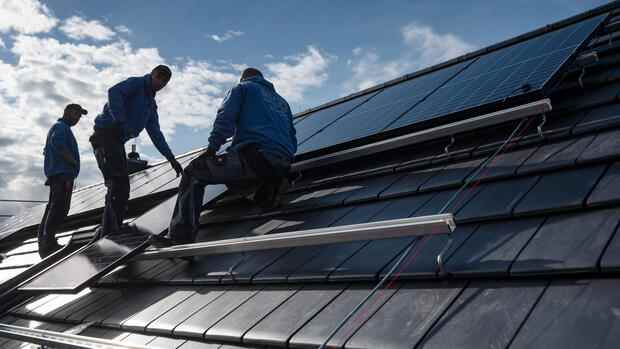The companies that make their money from the sale of renewable electricity should now be asked to pay.
(Photo: dpa)
Dusseldorf For more than a year, many energy companies have been making significantly higher profits than usual. This could soon be over. According to an initial key issues paper by the Federal Chancellery, the Federal Ministry for Economic Affairs and Climate Protection (BMWK) and the Federal Ministry of Finance (BMF), skimming off “random profits” should soon become a reality. It is intended to finance a large part of the costs of the electricity price brake for consumers announced on January 1st.
To this end, the federal government plans to siphon off the extraordinarily high profits from the sale of electricity generated with renewable energies, nuclear power, mineral oil, waste and brown coal for a limited period of time. Exceptions are storage, hard coal, natural gas, biomethane and special gases.
For the rest, the regulation should apply “retrospectively from September 1, 2022”, according to a paper. Although the details are not yet final, the federal government is still hoping for income in the double-digit billions. The excitement in the energy industry is high.
The chairwoman of the Federal Association of Renewable Energies (BEE), Simone Peter, criticizes: “We urgently appeal to those involved to leave the unconstitutional wrong path.” Above all, according to industry representatives, the retrospective levy from September is not compatible with EU law. According to a legal opinion commissioned by the BEE, there are no purely legal reservations against a so-called excess profit tax.
Top jobs of the day
Find the best jobs now and
be notified by email.
The Baden-Württemberg energy group EnBW also warns of negative consequences for necessary investments in the energy transition: “This is a strong regulatory intervention in a functioning market. Such should be limited to the foreseeable duration of the energy crisis and – very importantly – be limited by a clear date,” CFO Thomas Kusterer told the Handelsblatt. It is more than understandable that energy companies skim off revenues that they owe exclusively to the high electricity prices. However, according to Kusterer, it really depends on the specific design.
drivers of prices
For more than a year, the prices of coal, oil, gas and electricity have rallied like never before. According to the Federal Network Agency, the average wholesale electricity price in 2021 was EUR 96.85 per megawatt hour (MWh); in 2020 it was EUR 30.47 per MWh.
Electricity prices have been climbing immensely since autumn 2021.
(Photo: dpa)
On the spot market, i.e. in daily trading, the electricity trading prices shot up to new record values of 400 to 700 euros at the top. For comparison: In the past four years, the price has generally fluctuated between 50 and 70 euros per MWh.
Electricity prices have been climbing immensely since autumn 2021. Firstly because of the surge in demand after the global corona lockdowns; Since February 2022, with the outbreak of the Ukraine war, the lack of natural gas has been driving up electricity prices in Germany.
The profits made by those who profited from the crisis have been correspondingly large in recent months. The Essen-based energy giant RWE earned a profit of 2.8 billion euros (adjusted EBIT) in the first half of the year, more than a third more than in the previous year.
The beneficiaries of the crisis
In addition to RWE, numerous operators of wind farms and solar parks in Germany are benefiting from the increased electricity prices. The wind and solar park operator Encavis from Hamburg was able to increase its sales by 40 percent in the first six months of the year and its profit (adjusted EBIT) by as much as 60 percent. As a result, the company has adjusted its forecast for the full year upwards. The share price rose by almost 23 percent within a year.
In addition to RWE, numerous operators of wind farms and solar parks in Germany are benefiting from the increased electricity prices.
(Photo: IMAGO/Christian Ender)
While consumers and industry are suffering from high energy costs, such companies are reaping “excess profits”, many politicians, activists and experts have been criticizing for months. With the introduction of the electricity price brake, the profit skimming for those same companies is to be decided at the same time. A so-called “staircase model” is being discussed for this purpose.
This means that the upper revenue limit from which it is skimmed off should vary depending on the technology. How exactly this calculation looks like and where exactly the upper limit is for each type of power plant is not yet known. Expert Jens Burchardt from the management consultancy Boston Consulting Group says: “Due to the fact that the upper limits for electricity prices differ depending on the type of power plant, the skimming off of profits is relatively fair.” normal times.
>> Read here: This is how gas and electricity price brakes work – consumers can expect this help
Nevertheless, some of the companies affected not only generate electricity, but also have other business segments that have been negatively affected by the crisis, Burchardt points out. For example, the Norwegian energy giant Statkraft. The increase in electricity prices has also led to a significant increase in gross income at Statkraft. However, due to the simultaneous sharp increase in the amount of hedging for trade, adjusted EBIT in the second quarter, at the equivalent of EUR 370 million, was almost EUR 200 million below the previous year’s result.
Some representatives of the renewables industry are therefore in favor of paying off excess profits via a tax: “The solution is obvious: a carefully designed, temporary and technology-neutral tax on excess profits,” Statkraft Trading Manager Carsten Poppinga recently wrote in a guest article for the Industry portal Energate. However, this solution is not even considered by the government.
More: Gas price brake should be brought forward – electricity price is capped at 40 cents
